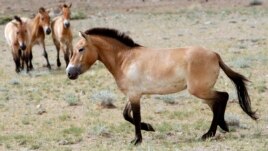11 March 2023
Researchers have found the earliest direct evidence for horseback riding. The evidence comes from 5,000-year-old human skeletons in central Europe.
The research study was published last week in the publication Science Advances.
Horseback riding was a development that changed history. It was "the fastest a human could go before the railroads," said David Anthony. He is a co-writer of the study and an archaeologist at New York's Hartwick College.

FILE - This photo taken on June 16, 2011, shows four horses after being released at the Khomiin Tal reservation in Western Mongolia. (AP Photo/Petr David Josek, File)
The researchers examined the bones of more than 200 ancient people in museum collections in Bulgaria, Poland, Romania, Hungary and the Czech Republic. The bones came from the period known as the Bronze Age between 3,000 and 5,000 years ago. The researchers looked for signs of "horse rider syndrome."
Martin Trautmann, another writer of the study, explained the condition. He said there are six markers that show whether a person rode an animal. They include wear marks on the hips, thigh bone and pelvis, said Trautmann, an anthropologist at the University of Helsinki in Finland.
The researchers identified five humans who likely rode horses. They are estimated to have lived between 4,500 and 5,000 years ago. They belonged to a Bronze Age people called the Yamnaya.
Alan Outram is an archaeologist at Britain's University of Exeter. He was not involved in the research, but he praised the methods the scientists used. He said, "There is earlier evidence for harnessing and milking of horses, but this is the earliest direct evidence so far for horseback riding."
Domesticating wild horses on the plains of Eurasia was a process, not a single event, the researchers said. Archaeologists have previously found evidence of people drinking horse milk. There have also been signs of horses controlled by harnesses dating back more than 5,000 years. But that does not mean humans rode the horses.
The Yamnaya culture developed in what is now part of Ukraine and western Russia. The Yamnaya are important because of their expansion across Eurasia in only a few generations. They moved west to Hungary and east to Mongolia, said University of Helsinki archaeologist and study co-writer Volker Heyd. "The spread of Indo-European languages is linked to their movement, and they reshaped the genetic make-up of Europe," Heyd said.
Their relationship with horses may have partly made this movement possible, the researchers suggested.
David Anthony, the Hartwick College archaeologist, said, "Horses expand the concept of distance – you begin to think about places previously out of reach as being reachable."
That does not mean the Yamnaya people were warriors on horseback. The horses they rode were likely not used in battlefield situations, Anthony said. But horses may have helped the Yamnaya more effectively send communications, build alliances and control the herds of cattle that were important to their economy.
I'm Ashley Thompson.
The Associated Press reported this story. Ashley Thompson adapted it for VOA Learning English.
___________________________________________________________________
Words in This Story
archaeologist –n. a scientist who studies past human life through objects and bones
museum –n. a building where things of cultural or scientific value are shown and knowledge about them is spread
syndrome –n. a usually medical condition that has certain identifiable signs
pelvis –n. the large that links the upper half of the body and the lower half
anthropologist –n. a scientist who studies human development from the earliest times to the present
harness –v. to attach a device to certain animals to control them for work
domesticate –v. to train an animal to accept the control of human beings
concept –n. an idea